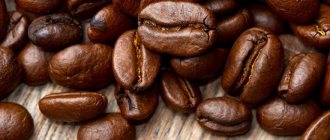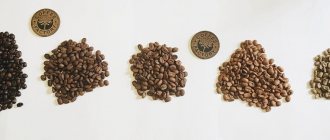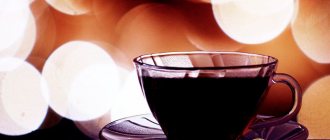The effect of coffee on human sleep
It is known that coffee is one of the main sources of caffeine among plant products. This substance is an active stimulant of the nervous and cardiovascular systems, which has an invigorating effect.
In each organism, the influence of coffee products can have its own shades:
- vigor, activation;
- elimination of drowsiness, muscle weakness;
- concentration, composure.
Under certain conditions of the body, the drink can also have the opposite effect: cause drowsiness, fatigue, lethargy, and apathy.
Everyone knows that coffee should have an invigorating and tonic effect, but this statement is not entirely accurate. Probably, information about golden grains became the object of advertising when the drink was popularized among the masses and only its beneficial aspects were presented.
In fact, the work of coffee is more complicated, and its secret lies in the composition of the drink. The coffee bean consists of 2 “layers” – the core and the shell. The outer part accumulates caffeine compounds, and the inner part accumulates theobromine. These substances affect the body in different ways.
Whole bean and ground coffee contain both components, and instant coffee is prepared only from kernels.
The caffeine shell is used for the production of pharmacological drugs, food additives and energy drinks.
It turns out that the caffeine content in the instant powder is negligible, which is why many people notice that natural grain coffee has an invigorating effect, while freeze-dried coffee has no effect or even puts you to sleep.
Effects of caffeine
Experts say that the caffeine component has an invigorating effect, which begins immediately after drinking the drink and lasts only 20-35 minutes - depending on the type of beans and the characteristics of the body.
Caffeine activates the nervous system, makes the brain work faster, stimulates heart contractions, accelerates blood flow, helps eliminate toxins, and speeds up digestive processes and metabolism.
All this creates a feeling of a surge of energy, but this effect does not last long, and - as often happens - it is replaced by a phase of rest, and sometimes fatigue. This is partly due to the fact that coffee does not bring energy with it, but only awakens the body's internal resources.
Effect of theobromine
The substance theobromine has a relaxing and calming effect; unlike caffeine, it dilates blood vessels and helps normalize heart rate and blood pressure.
The tricky thing about the coffee effect is that, in contrast to caffeine, the action of its “companion” often causes drowsiness and loss of strength in people.
To neutralize the soporific effect, it is recommended to sip a portion of coffee for 1-1.5 hours, then new caffeine molecules will balance the effect of theobromine.
The effect of coffee in some sources is called the “thirtieth kilometer”. This is due to the fact that drivers who drink a dose of coffee on the road manage to drive about 30 km invigorated while the caffeine takes effect, and then suddenly feel lethargic.
This increases the risk of accidents, which is why experts do not recommend drinking coffee before setting off, especially after insufficient sleep, and you should only get behind the wheel if you are truly alert and sober.
When coffee is good for you
Since the influence of many people’s favorite drink on the quality of sleep is quite varied, scientists continue to conduct various experiments. Let's talk about two of the most interesting:
- In the USA, an experiment was conducted with a group of people who were offered a cup of espresso every time before bed. As a result, it was found that caffeine literally blocks the production of melatonin, a hormone that promotes healthy sleep, for as much as 40 minutes. To put it simply, it knocks down our “biological” clock, slows it down, disrupting the natural course.
In normal situations, this will be a negative point, but for those who are forced to frequently change time zones when flying, coffee will help you quickly adjust to the right time and adapt your body.
- In Japan, as a result of one test, it is known for sure that the invigorating effect of coffee appears only after 20 minutes. Two groups of student subjects were asked to drink a cup of drink, then one of them was sent to a short 20-minute nap. After waking up, they felt a strong surge of energy, unlike the second group that did not rest, and responded better to the proposed tasks.
Benefits of caffeine
The main component of coffee is caffeine. It is he, being a natural stimulant, that provides the body with a boost of vigor. The beneficial properties of the drink include the following:
Stimulation of cardiac activity and nervous system. Coffee beans contain the natural alkaloid caffeine, which increases blood pressure.
- Caffeine prevents the onset of Parkinson's disease. Such conclusions were made by scientists after a series of experiments and observations in which the subjects drank coffee. More often the effect manifested itself in the male half.
- Prevention of type 2 diabetes mellitus. Caffeic and chlorogenic acid, as well as caffeine, suppress the accumulation of amyloid protein, which affects the development of diabetes.
- One of the scientifically unconfirmed facts is the suppression of depression.
- Reducing the risk of developing liver cirrhosis. Coffee contains many substances that science has not yet classified, one of them has a similar property.
- Increased gastric secretion. Thanks to the substances contained in coffee beans, the acidity of gastric juice increases. Very useful for gastritis with low acidity.
- Prevention of cardiovascular diseases and stroke. Under the influence of caffeine, the blood vessels of the brain and heart dilate.
Coffee as a sleeping pill
Coffee can act as a sleep aid in three cases:
- for those who are sensitive to caffeine;
- for experienced coffee drinkers who drink more than 4 cups a day;
- for instant coffee lovers.
If a person is insensitive to the energizing effects of caffeine, this does not mean that the substance causes drowsiness. This is where the unconscious desire to stand out and demonstrate exclusivity comes into play: the drink wakes everyone up, but puts one to sleep. However, no one has canceled the negative effect of the alkaloid on the heart and blood vessels. Therefore, it is better not to abuse coffee.
For those who drink more than 4 cups of coffee daily, the body tries to resist the effects of the alkaloid. The braking mechanism turns on, and after coffee the person wants to sleep. This is a rather dangerous symptom, and the daily dose of the drink should be reduced.
Instant coffee is obtained from natural coffee. But besides caffeine, coffee beans contain another alkaloid – theobromine. It causes vasoconstriction of the kidneys and drowsiness. When drinking a bean drink, caffeine inhibits the effect of theobromine. Only people with kidney disease can feel mild discomfort due to vasoconstriction: a barely noticeable nagging pain that can be easily relieved by drinking a glass of water.
The highest concentration of caffeine in the bean is near the outer shell; the closer to the center, the more theobromine. When making some brands of instant coffee, the top layer is removed from the beans. As a result, the balance of caffeine and theobromine in the drink is disrupted, and coffee begins to act as a sleeping pill.
If instant coffee makes you drowsy, it makes sense to choose a different brand or opt for a drink made from natural ground beans.
How to drink coffee to stay awake
Some consumers may believe that the more caffeine that enters the body, the more alert the person feels. It is not true. Even 1-2 cups of coffee drink can affect more than half of the specific receptors of the nervous system.
The effect lasts 5-6 hours. Additional servings will not enhance the effects of caffeine, and may even lead to an overdose and unpleasant consequences.
To cheer up and concentrate on work, it is enough to drink 1-2 cups of coffee a day if we are talking about a natural drink, and 3-4 - when it is an instant one. This should be done gradually: if you drink coffee in one gulp, especially when the drink is sweet, its effect may be abrupt.
Milk can slow down, or rather prolong the effect. Experts say that coffee components combine with dairy components in such a way that the digestion of caffeine slows down and it enters the brain gradually.
When it is difficult for the body to wake up without a portion of a stimulant, and coffee does not help or begins to cause unpleasant sensations - heartburn, liver discomfort, drowsiness - you can always replace it with a cup of tea, black or green. It will help normalize the pH and will keep the body alert much more gently.
How to properly use the invigorating effect
Managing time
You get the benefits of a strong drink when you drink it in small quantities for vigor. Caffeine liquid relieves fatigue somewhat.
Now let's find out how many hours before bedtime you can enjoy a cup of espresso or a caffeinated drink. If you do not want problems sleeping, then drink them no later than four hours before.
It is not harmful to drink caffeinated liquids before bed if you work the night shift. A cup of strong espresso or other coffee will invigorate and energize you.
The effect of caffeine is useful if you are planning to sleep no more than a third of an hour. You will be able to fall asleep quickly, although in such a short time the sleep will be shallow.
Larks and owls
People who sleep after drinking coffee may feel relaxed for a short time. After twenty minutes they begin to act, inhibiting the synthesis of sleep-forming hormones.
Interesting! How long does coffee last?
According to this scheme, it is convenient to drink caffeine liquids every four hours. The main thing is to get full rest at the first opportunity so as not to exhaust the body.
While researching the question of whether it is possible to drink coffee at night, American scientists from Colorado State University discovered that the nervous system of early risers is more sensitive to caffeine than that of night owls.
If a “lark” drinks caffeine liquid in the late afternoon, he suffers from insomnia. But night owls calmly transition to deep sleep even after drinking espresso.
Signs that drinking is interfering with sleep
Coffee invigorates the body in several ways:
- triggers brain function;
- activates blood flow, increases blood pressure;
- stimulates appetite;
- increases heart rate;
- supports kidney function, produces a mild diuretic effect.
When so many processes in the body are accelerated at the same time, he cannot fall asleep anytime soon.
Sometimes caffeine excites the nervous system so much that a person is not able to fall asleep even at night (or in accordance with his schedule), although he feels tired physically and mentally. This is why experts do not recommend drinking coffee at night, or rather, 3-4 hours before going to bed.
At the same time, coffee normally does not have such a “killer” and “explosive” effect on the human body and sleep as advertising promises. In general, the drink is harmless, and its effect should not be pronounced.
Caffeine only invigorates, but does not give strength to the body, so you should not get too carried away with the aromatic elixir.
The properties of coffee beans have not been fully studied, but it is known that it can affect each person with some differences.
Why does coffee make you sleepy?
There are several reasons why coffee invigorates or, conversely, puts you to sleep. Direct action has already been described. As for the opposite, this condition can be caused by fatigue of the body, which can no longer respond to caffeine, or by the quality of the product.
Diseases
Normally, coffee stimulates the activity of internal systems, but some conditions can provoke the opposite reaction. Caffeine and theobromine enter the bloodstream during digestion, and only then to the nervous system.
Impaired breakdown and absorption of these substances can cause an overdose or rejection, so the drink should be consumed with extreme caution in the following conditions:
- for diseases of the digestive system - liver, pancreas and gastrointestinal tract;
- for nervous diseases, under stress, sleep disorders, as well as hormonal imbalances;
- in case of coronary heart disease, arrhythmia and angina pectoris, with high blood pressure;
- with renal failure.
For example, liver disease prevents the blood from filtering normally and breaking down active compounds. This means that people with fibrosis, cirrhosis and liver failure need to be content with much smaller doses of caffeine so as not to overload the body, otherwise large doses of the energizing substance will be delivered to the nervous system. Excess theobromine can cause drowsiness.
Another reason is the exhaustion of the adrenal glands, which normally produce adrenaline. If the glands have nothing to release into the blood in response to stimulation by caffeine, the body will only more clearly sense the lack of strength and protest.
In these cases, the stimulant acts on a tired body that does not have the resources for activation. A natural reaction in such a state is the desire to restore strength, that is, to sleep or eat something. Sometimes coffee not only makes you sleepy, but also wakes up a strong appetite.
After illnesses, lack of sleep and stress, it is better to replace coffee with herbal or fruit tea. You should not choose soothing drugs, like chamomile or mint, but neutral and tonic ones, for example, thyme, lemon or currants. A vitamin cocktail will truly give you strength and help you recover.
Stimulant overdose
One of the reasons why caffeine stops activating the body may be an overdose of the substance. On the one hand, there is a threshold for the action of the stimulant: as already mentioned, it is enough to drink 1-2 cups for the drink to act for 4-6 hours. Exceeding this dose will overload the nervous system and liver.
The human body is programmed to maintain balance. When a stimulant is taken in excessive quantities, the body becomes accustomed to its effects and creates compensatory mechanisms. Because of this, you have to increase the portion in order to tone the nervous system, and over time, coffee no longer invigorates.
In such cases, it is necessary to give up the drink for a while. In 2-4 weeks, all receptors will be restored and the “power” of your favorite coffee will again become high.
On the other hand, there is general overwork of the body, when the nervous system does not have enough strength to react to a dose of caffeine with activity. Then the opposite effect occurs - lethargy and lethargy. And an overdose in the form of an extra cup can completely “turn off” the system, just as traffic jams are knocked out when there is an overvoltage in the electrical network.
Then there is no point in drinking one serving after another. It's better to keep sweet coffee and some nuts near your work area and sip a little at a time while supporting your brain with nutritious snacks.
Coffee quality
Finally, the effect of the drink largely depends on its class. Elite grain blends, as a rule, give a pleasant sensation and do not cause discomfort. A low-grade product most often provokes heartburn and has an unpredictable effect on the nerves.
Instant coffee often makes you sleepy because it lacks the caffeine component , but more often than not, such a drink is simply ineffective. Coffee is one of those products that you shouldn’t skimp on to maintain your health, and it’s better to avoid cheap raw materials in favor of herbal tea.
What to do if coffee makes you sleepy
If coffee drinks cause lethargy, you need to reconsider your diet and lifestyle, and perhaps even consult a doctor. With good general health, drowsiness from drinking coffee can occur only if the body is tired: the person has not had enough sleep or is in a state of chronic stress or illness.
When large doses of the drink cause weakness and lethargy, it is necessary to temporarily abandon it. Warming up, walking in the fresh air or ventilating the room will help awaken the body. If such measures do not help, then the nervous system really needs rest and it’s better to get some sleep.
When you feel sleepy with coffee, you can try one of the options to cheer yourself up:
- switch to tea drinks;
- give up coffee and tea to allow the body to take a break from caffeine and recover;
- move more and breathe fresh air;
- drink clean water to reduce the concentration of active substances in the body.
Caffeine and theobromine also sometimes interact with certain medications, causing drowsiness or insomnia. In such cases, you should consult your doctor or pharmacist. Perhaps they cannot be combined.
How to fall asleep after a nightcap
If coffee causes a rapid heartbeat, trembling hands, increased blood pressure, anxiety, or interferes with sleep, just drink a glass of clean water - this will help cleanse the blood.
Fresh air and a herbal pillow or aromatherapy with soothing oil can also help you fall asleep. Just apply a couple of drops to your wrists and massage your temples.
Coffee and sleep quality are not as closely related as you might think. When the body needs rest, you should not torture it with “magic remedies”. A fragrant drink, first of all, should bring sensual pleasure, and not become a subject of painful addiction. Live in harmony and enjoy delicious coffee recipes.
Who is prohibited from drinking at night?
Natural and even strong coffee drinks provoke a rapid heartbeat, increase blood pressure (blood pressure), and double the level of homocysteine, which can cause heart attack and stroke.
Do not drink at night if you have a weak bladder. Even if caffeine does not act as a stimulant, you will still have to get up to go to the toilet often, as the liquid will act as a diuretic.
If you are healthy, there is nothing to be afraid of. But as a preventative measure, it is better to drink coffee with milk. And in its strong pure form – no more than 2-3 cups a day.
After 30-40 years, doctors recommend that coffee drink lovers give up their evening dose.
We found out how coffee affects sleep. Now let's figure out what to do if the liquid has already been drunk and you need to sleep.











